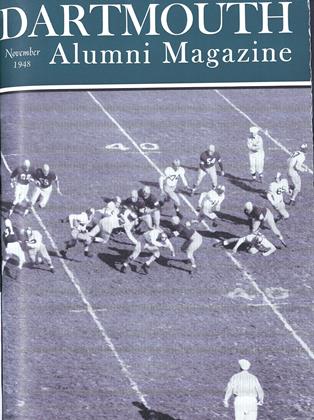Before a gathering of 60,000 persons, including the University's new president Harold Stassen, Pennsylvania conducted an aggressive defense with such dash and ferocity that they scored four touchdowns and thereby decisively defeated Dartmouth 26-13. A game that had been billed as a sheer display of power for the Red and Blue failed in some respects to follow the script, for each of the four touchdowns amassed by the Philadelphians was caused by the alert capitalization upon Dartmouth errors or misadventures rather than by the expected outbreak of naked force. Two blocked kicks, a pass interception, and a bad pass from center respectively set up the four Penn touchdowns. This is what I meant by "aggressive defense" and in no way suggests that Pennsylvania was not the better team. They merely varied the routine from that of the past few years, during which period they have defeated Dartmouth six times in succession.
The game was marked by a battle between a traditionally tremendous Pennsylvania line, (averaging better than 210 pounds from end to end) and an array of spirited and high-stepping Dartmouth backs, most of them sophomores. While the first Green line, anchored by the massive Jenkins, was in the game, Pennsylvania was not notably successful in advancing the ball and our own backs were occasionally able to get rolling. But the Dartmouth first line had to rest from the relentless pounding of two or three equally big and tough Penn lines, which Coach George Munger kept parading on the field. And when the first Green line was out of the game conditions were definitely not sound. The Penn forward wall came rampaging through to spill the Dartmouth ball carriers, rush the passers, and generally bedevil Coach McLaughry's charges. At the same time, without the little band of first string caliber guards, tackles, and center(s) at Dartmouth's disposal, we were unable to advance the ball consistently and on several sequences of plays lost more yards than we gained.
But the tone of the game as a whole was not this melancholy. After Penn scored two touchdowns in the second period, a Dartmouth sophomore backfield composed of McCraney, Tyler, Roberts, and Isbey came roaring down the field from their own 19-yard line in a sustained drive that culminated in a touchdown pass from McCraney to Red Rowe. This advance was marked by the hard and shifty running of Bob Tyler at left halfback, who showed flashes of his expected brilliance. Dartmouth left the field at the half on the short end of a 6-12 score, but still very much in the ball game.
In the second half, Penn scored twice more, once in the third and again in the final period, making the score 26-6. But the Green was not yet counted out. Sparked by Bob Tyler's 34-yard return of a kickoff, the Green pounded to its second score. This march was directed by another sophomore quarterback, Gil Mueller, who had hitherto languished in the comparative obscurity of the fourth team. His direction of plays, his accurate passing, and his own 40-yard gallop on a fake hand-off made this second touchdown very much a Mueller performance. Appropriately enough, the same lad directly collaborated in the score, when he tossed a goal line pass to end Bill Felton, who fell over into pay dirt. It is revealing no secrets to suggest that Mr. Mueller might henceforth find himself elevated in status after this sterling effort.
The statistics showed that Penn was not exactly an offensive powerhouse on this occasion. Both teams ran up 11 first downs, with the Green equalling their rivals in this department. Penn tried 24 passes and completed 10 for a net gain of only 68 yards, whereas Dartmouth was successful in 6 out of 15 attempts for a total of 113 yards, including both their touchdowns. The brilliant opportunism of the Red and Blue spelled the margin of victory, an opportunism made possible by the superior manpower up front and demonstrated in the kicks that were blocked, the others that were hurried, and the passes that were intercepted at crucial moments. The injury to center George Schreck midway in the first half did not help matters any either. This offensive and defensive stalwart was sidelined with a knee ailment and watched the second half glumly from the bench.
 View Full Issue
View Full Issue
More From This Issue
-
 Article
ArticleCIVIL RIGHTS IN AMERICA
November 1948 By ROBERT K. CARR '29, -
 Article
ArticleA Report from Europe
November 1948 By EDWIN A. BOCK '43 -
 Class Notes
Class Notes1924
November 1948 By JAMES T. WHITE, RICHARD A. HENRY -
 Class Notes
Class Notes1918
November 1948 By ERNEST H. EARLEY, DONALD L. BARR, DAVID L. GARRATT -
 Article
ArticleConvocation Address
November 1948 -
 Class Notes
Class Notes1929
November 1948 By F. WILLIAM ANDRES, EDWIN C. CHINLUND, MORTON C. JAQUITH
Francis E. Merrill '26
-
 Article
ArticleHarry Hillman, Sportsman
January 1941 By FRANCIS E. MERRILL '26 -
 Sports
SportsNOTRE DAME 34, DARTMOUTH 0
November 1945 By Francis E. Merrill '26 -
 Sports
SportsSQUASH
February 1948 By Francis E. Merrill '26 -
 Sports
SportsValedictory
July 1951 By Francis E. Merrill '26 -
 Sports
SportsSwimming
February 1952 By FRANCIS E. MERRILL '26 -
 Books
BooksINDUSTRIAL SOCIETY AND SOCIAL WELFARE.
July 1958 By FRANCIS E. MERRILL '26







